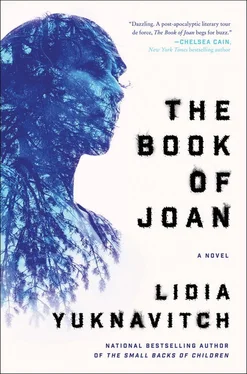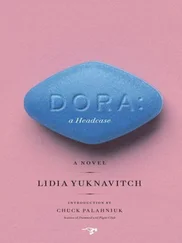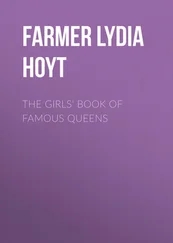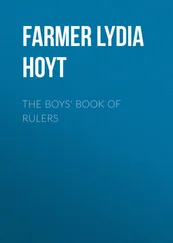Across from her, with a knife at her neck, Leone closes her eyes. Then opens them and smiles.
Unbeknownst to the intruder, Leone has slipped her hand down low enough to recover her favorite companion: a Laguiole , a French fighting knife beloved for its cruciform blade and its ties to history. Little Bee.
Leone swings her arm up and punctures the man’s neck with the knife before he can react. Joan crosses her arms over her chest and tilts her head to the side, silently wondering if Leone has delivered a death stab or merely a wound. Judging from the blood flow, a wound. But this poor pale soul, grabbing at his neck and staggering around the dirt floor in circles, may die anyway.
She walks over to the man, who drops to his knees and sits panting, his head down, his shoulders heaving.
“What shall we do with you?” Joan says, squatting down to his level while Leone cleans blood off of Little Bee on her pants leg.
The man lifts his head.
Joan puts her fingers under his chin to tilt his face upward. He opens his mouth.
“ C’est moi, ” he whispers, “Peter…” Blood veins down his forearm between his fingers in rivers. “You are…” he says almost inaudibly, slumping farther toward the ground, sucking in a great chestful of air. “You are real after all.” And then his head thuds against the dirt.
A jolt of recognition shoots through Joan’s shoulders. She lifts his torso. She cradles his head. “Peter?” she shouts.
Leone at her side, wiping dirt from the man’s face: “Your brother?”
In the auroral glow of the cave’s light, now orange, then blue and green, shimmering, shifting, Joan watches a dozen or so tiny black worms traverse the landscape of her own palm.
Worms from hell. That’s what they’d named the tiny creatures upon their discovery long ago—unusual nematodes living and thriving miles below the earth’s surface in water hot enough to scald a human hand. She remembers reading about them as a child in school.
And yet here they are, surviving forty billion years without notice. That’s how dumb we are about our own origins, our present tense, our future survival. We always look up. What if everything that mattered was always down ? Where things are base and lowly. Where worms and shit and beetles bore their way along. Halicephalobus mephisto, named for Mephistopheles, “He who loves not the light . ” Lords of the Underworld. “Discovered” back in the day, as if they haven’t already been here forever.
Joan squats next to her dying brother and watches his eyelids twitch. Her thighs burn from crouching so long next to him. Not long now. He’s in that place between sleep and dead. Soon he’ll turn to energy. Dirt. Worms’ meat. She strokes his head. She remembers him as a boy: his dark thick hair, his eyelashes. Then she dumps the palmful of little worms onto his forehead. She doesn’t know why. He doesn’t move.
The first nematodes found in the rock-walled mines of South Africa were radiation-eating microbes, complete with nervous, digestive, and reproductive systems. What did it ever mean, discoveries of new realms of biology on Earth? At the time, scientists were giddy over the implications for extraterrestrial research, or astrobiology. A smile stretches over Joan’s face. All that looking up—it meant only that we barely had time to learn about the world around us before the whole shithouse came down. It meant that life not only went on in so-called impossible, inhospitable places, it flourished.
Absentmindedly, Joan’s fingers flutter at the blue light at the side of her head. Radical changes in morphology brought on by the temper of the sun. Halicephalobus mephisto.
Her brother moans the moan of the dying. She can see Leone’s figure approaching from a cave corridor. She smells her. Dirt and water and skin.
What she’s learned from the worms, in her life as a survivor, is more profound than any philosophy or volume of man-made knowledge. The hell-worm is resistant to high temperatures, reproduces asexually, and feeds on subterranean bacteria and toxins. The tiny black swirling colonies live in groundwater that is three to twelve thousand years old. They survive in waters with next to no oxygen. They ignore science and carry on.
He who loves not the light. “Like me,” Joan whispers to her near corpse of a brother. His body shudders under her speech.
Like the little worm devils, Joan also found what scientists had left behind when the Earth’s population was subjected to survival of the fittest: fungi. Amoebas. Multicellular life-forms adapting and evolving at fantastic rates—all of it underground. Blind fish and transparent lizards and bone-white long-legged spiders. Spectral bats. Electric freshwater eels. Sound. Light. Energy. And not just in cave-dwelling animals. In plants, too. Living energy. Without photosynthesis.
Like me, she thinks.
But now her hands tingle. Leone. Next to her.
“Are you going to do it?”
Joan raises her head from her squatting position and speaks to Leone’s pubis. Before she can stop her own imagination, she pictures the barren cave of Leone’s reproductive system. “I don’t know.”
“He’s your brother.” Leone sighs.
“He’s dying.” Joan looks up. “That’s what the dead do. They die. We’re meant to die. From the moment we are born.”
“Bullshit.” Leone shifts her weight to one boot and crosses her arms over her breasts. “No one will ever know. It’s just you, me, and him.” Leone puts her hand on the top of Joan’s head. “And if he knows anything about… anything, we need to hear from him.”
What do we owe the dying? Joan closes her eyes and thinks of burying her face between Leone’s legs. Her whole chest cavity aches, as if her ribs are caving in. Leone, of course, is right. Not because any familial loyalty or love exists between Joan and her brother—too much has happened since. They share DNA, but only in the way the stars and planets and ocean flotsam do. But he’s traveled all this way to find her, and she doesn’t even know what “all this way” really means. Where did he come from? What does he have to tell? How has he survived? Are there others?
There was only one way to find out, and that was one way she’d vowed never to repeat.
When Joan learned she could raise the dead, she was fifteen. CIEL was barely in control, engineers still building it ever upward and away from the dying masses. Jean de Men conjured himself as leader. The water wars had ravaged all the continents, laying waste to what vegetation remained under the gray orange glow of the dying sun. People had become territorial animals, Darwinian cartoons. Cannibalism was rampant except among clusters of well-armed cells, people brought together by desperate familiarity. But cannibalism wasn’t the worst of it. Wars were not the worst of it. A blotted sun, starvation, radiation, violence, terror, were not the worst of it. All the dire fears of a population’s mighty history had been proven petty.
The worst of it were the radical changes in the human body.
After every human lost its hair, after fingernails and toenails began peeling away, humanity itself flashed backward.
Penises atrophying, curling up and in, like baked snails.
Vaginas suturing themselves shut, using the very secretions that once lubricated the reproductive system. Without fully understanding why, Joan was the only one spared.
Children born with unformed genitals, without ears, with barely there translucent lids on their eyes, with unformed fingers. Webbed toes. Little protuberances at the base of the tailbone.
Devolution.
Читать дальше












